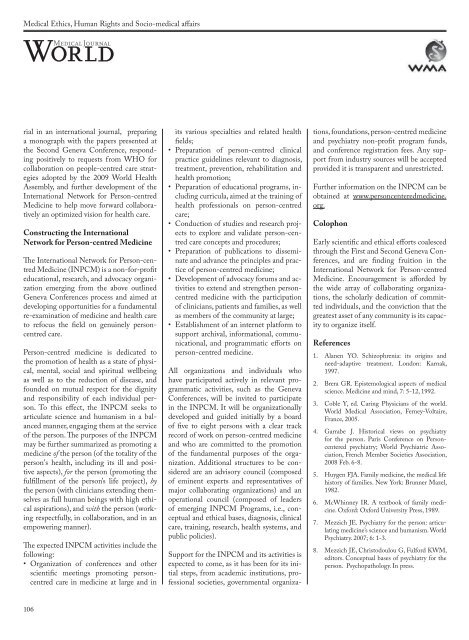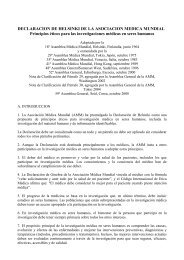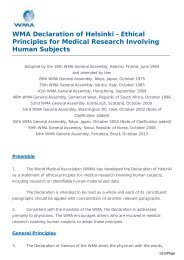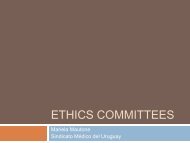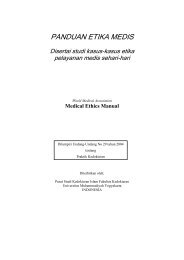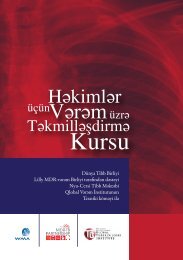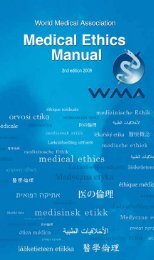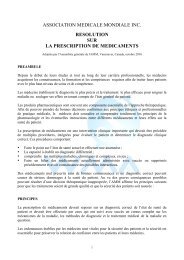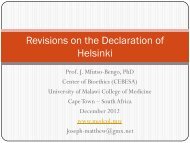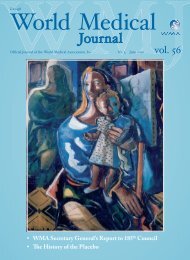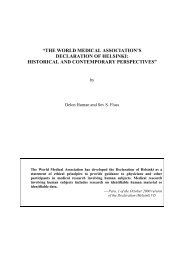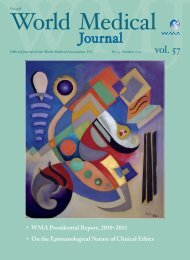wma 7-2.indd - World Medical Association
wma 7-2.indd - World Medical Association
wma 7-2.indd - World Medical Association
You also want an ePaper? Increase the reach of your titles
YUMPU automatically turns print PDFs into web optimized ePapers that Google loves.
<strong>Medical</strong> Ethics, Human Rights and Socio-medical affairs<br />
rial in an international journal, preparing<br />
a monograph with the papers presented at<br />
the Second Geneva Conference, responding<br />
positively to requests from WHO for<br />
collaboration on people-centred care strategies<br />
adopted by the 2009 <strong>World</strong> Health<br />
Assembly, and further development of the<br />
International Network for Person-centred<br />
Medicine to help move forward collaboratively<br />
an optimized vision for health care.<br />
Constructing the International<br />
Network for Person-centred Medicine<br />
The International Network for Person-centred<br />
Medicine (INPCM) is a non-for-profit<br />
educational, research, and advocacy organization<br />
emerging from the above outlined<br />
Geneva Conferences process and aimed at<br />
developing opportunities for a fundamental<br />
re-examination of medicine and health care<br />
to refocus the field on genuinely personcentred<br />
care.<br />
Person-centred medicine is dedicated to<br />
the promotion of health as a state of physical,<br />
mental, social and spiritual wellbeing<br />
as well as to the reduction of disease, and<br />
founded on mutual respect for the dignity<br />
and responsibility of each individual person.<br />
To this effect, the INPCM seeks to<br />
articulate science and humanism in a balanced<br />
manner, engaging them at the service<br />
of the person. The purposes of the INPCM<br />
may be further summarized as promoting a<br />
medicine of the person (of the totality of the<br />
person's health, including its ill and positive<br />
aspects), for the person (promoting the<br />
fulfillment of the person’s life project), by<br />
the person (with clinicians extending themselves<br />
as full human beings with high ethical<br />
aspirations), and with the person (working<br />
respectfully, in collaboration, and in an<br />
empowering manner).<br />
The expected INPCM activities include the<br />
following:<br />
• Organization of conferences and other<br />
scientific meetings promoting personcentred<br />
care in medicine at large and in<br />
its various specialties and related health<br />
fields;<br />
• Preparation of person-centred clinical<br />
practice guidelines relevant to diagnosis,<br />
treatment, prevention, rehabilitation and<br />
health promotion;<br />
• Preparation of educational programs, including<br />
curricula, aimed at the training of<br />
health professionals on person-centred<br />
care;<br />
• Conduction of studies and research projects<br />
to explore and validate person-centred<br />
care concepts and procedures;<br />
• Preparation of publications to disseminate<br />
and advance the principles and practice<br />
of person-centred medicine;<br />
• Development of advocacy forums and activities<br />
to extend and strengthen personcentred<br />
medicine with the participation<br />
of clinicians, patients and families, as well<br />
as members of the community at large;<br />
• Establishment of an internet platform to<br />
support archival, informational, communicational,<br />
and programmatic efforts on<br />
person-centred medicine.<br />
All organizations and individuals who<br />
have participated actively in relevant programmatic<br />
activities, such as the Geneva<br />
Conferences, will be invited to participate<br />
in the INPCM. It will be organizationally<br />
developed and guided initially by a board<br />
of five to eight persons with a clear track<br />
record of work on person-centred medicine<br />
and who are committed to the promotion<br />
of the fundamental purposes of the organization.<br />
Additional structures to be considered<br />
are an advisory council (composed<br />
of eminent experts and representatives of<br />
major collaborating organizations) and an<br />
operational council (composed of leaders<br />
of emerging INPCM Programs, i.e., conceptual<br />
and ethical bases, diagnosis, clinical<br />
care, training, research, health systems, and<br />
public policies).<br />
Support for the INPCM and its activities is<br />
expected to come, as it has been for its initial<br />
steps, from academic institutions, professional<br />
societies, governmental organizations,<br />
foundations, person-centred medicine<br />
and psychiatry non-profit program funds,<br />
and conference registration fees. Any support<br />
from industry sources will be accepted<br />
provided it is transparent and unrestricted.<br />
Further information on the INPCM can be<br />
obtained at www.personcenteredmedicine.<br />
org.<br />
Colophon<br />
Early scientific and ethical efforts coalesced<br />
through the First and Second Geneva Conferences,<br />
and are finding fruition in the<br />
International Network for Person-centred<br />
Medicine. Encouragement is afforded by<br />
the wide array of collaborating organizations,<br />
the scholarly dedication of committed<br />
individuals, and the conviction that the<br />
greatest asset of any community is its capacity<br />
to organize itself.<br />
References<br />
1. Alanen YO. Schizophrenia: its origins and<br />
need-adaptive treatment. London: Karnak,<br />
1997.<br />
2. Brera GR. Epistemological aspects of medical<br />
science. Medicine and mind, 7: 5-12, 1992.<br />
3. Coble Y, ed. Caring Physicians of the world.<br />
<strong>World</strong> <strong>Medical</strong> <strong>Association</strong>, Ferney-Voltaire,<br />
France, 2005.<br />
4. Garrabe J. Historical views on psychiatry<br />
for the person. Paris Conference on Personcentered<br />
psychiatry; <strong>World</strong> Psychiatric <strong>Association</strong>,<br />
French Member Societies <strong>Association</strong>,<br />
2008 Feb. 6-8.<br />
5. Huygen FJA. Family medicine, the medical life<br />
history of families. New York: Brunner Mazel,<br />
1982.<br />
6. McWhinney IR. A textbook of family medicine.<br />
Oxford: Oxford University Press, 1989.<br />
7. Mezzich JE. Psychiatry for the person: articulating<br />
medicine’s science and humanism. <strong>World</strong><br />
Psychiatry. 2007; 6: 1-3.<br />
8. Mezzich JE, Christodoulou G, Fulford KWM,<br />
editors. Conceptual bases of psychiatry for the<br />
person. Psychopathology. In press.<br />
106


